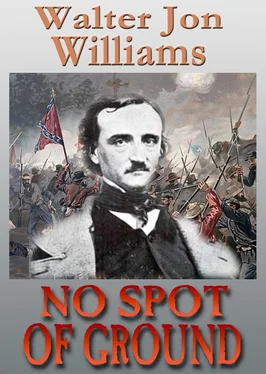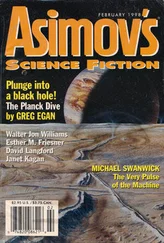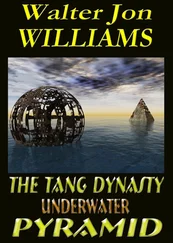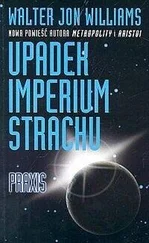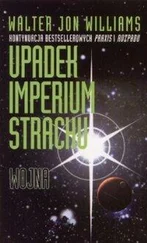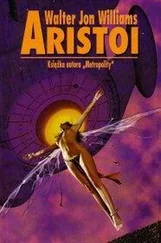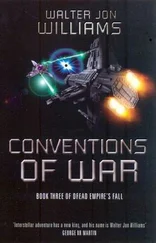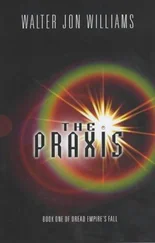Walter Williams - No Spot of Ground
Здесь есть возможность читать онлайн «Walter Williams - No Spot of Ground» весь текст электронной книги совершенно бесплатно (целиком полную версию без сокращений). В некоторых случаях можно слушать аудио, скачать через торрент в формате fb2 и присутствует краткое содержание. Год выпуска: 0101, Издательство: Baen Books, Жанр: Альтернативная история, на английском языке. Описание произведения, (предисловие) а так же отзывы посетителей доступны на портале библиотеки ЛибКат.
- Название:No Spot of Ground
- Автор:
- Издательство:Baen Books
- Жанр:
- Год:0101
- ISBN:нет данных
- Рейтинг книги:3 / 5. Голосов: 1
-
Избранное:Добавить в избранное
- Отзывы:
-
Ваша оценка:
- 60
- 1
- 2
- 3
- 4
- 5
No Spot of Ground: краткое содержание, описание и аннотация
Предлагаем к чтению аннотацию, описание, краткое содержание или предисловие (зависит от того, что написал сам автор книги «No Spot of Ground»). Если вы не нашли необходимую информацию о книге — напишите в комментариях, мы постараемся отыскать её.
No Spot of Ground — читать онлайн бесплатно полную книгу (весь текст) целиком
Ниже представлен текст книги, разбитый по страницам. Система сохранения места последней прочитанной страницы, позволяет с удобством читать онлайн бесплатно книгу «No Spot of Ground», без необходимости каждый раз заново искать на чём Вы остановились. Поставьте закладку, и сможете в любой момент перейти на страницу, на которой закончили чтение.
Интервал:
Закладка:
When Virginia seceded and Maryland seemed poised to follow, Poe headed south with Sextus, a pair of fine horses, equipage, a curved Wilkinson light cavalry sword, Hardee’s Tactics , a brace of massive nine-shot Le Mat revolvers, and of course the twelve hundred in gold. He kissed Evania and his beloved Mrs. Forster farewell- within a few months he would return with an army and liberate Shepherd’s Rest and the rest of Maryland. He, as well as Byron, could be martial when the cause of liberty required it. He rode away with a singing heart.
Before him, as he woke in his bed his first night in Richmond, he saw his vision, the benevolent madonna giving him her benediction. In going south he was being, he thought, faithful to Virginia; and he hoped to find the spirit, as well as the name, of his lost love embodied in the state to which he swore allegiance.
Jefferson Davis was pleased to give a colonel’s commission to a veteran of the wars of Greek liberation, not to mention a fellow West Pointer- the West Point story, at least, being true, though Poe did not remind the President that, because the horrid Allan refused to support him, Poe had got himself expelled from the academy after turning up stark naked at a parade.
There was no regiment available for the new colonel, so Poe began his military career on the staff of General Joseph E. Johnston, commanding in the Shenandoah Valley. He occupied himself by creating a cypher for army communications which, so far as he knew, had survived three years unbroken.
Johnston’s army moved east on the railroad to unite with Beauregard’s at First Manassas, and there Poe saw war for the first time. He had expected violence and death, and steeled himself against it. It gave him no trouble, but what shocked him was the noise . The continual roll of musketry, buzzing bullets, shouted orders, the blast of cannon, and the shriek of shells- all were calculated to unstring the nerves of a man who couldn’t abide even a loud orchestra. Fortunately he was called upon mainly to rally broken troops- it had shocked him that Southern men could run like that- but in the end, after he’d got used to the racket, he had ridden, bullets singing over his head, in the final screaming, exhilarating charge that swept the Yankee army from the field, and he could picture himself riding that way forever, the fulfillment of the Byronic ideal, sunset glowing red on the sword in his hand as he galloped north to Maryland and the liberation of his home.
Maryland never managed to secede, somehow, and Poe’s Byronic liberation of his home state had to be postponed. Via blockade-runner, Poe exchanged passionate letters with his wife while remaining, in his heart, faithful to Virginia.
At the horrible, bungled battle of Seven Pines the next year, Major General Daniel Harvey Hill made a properly Byronic, if unsupported, attack against McClellan’s left and lost half his men, as well as one of his brigadiers. Poe was promoted and given the shattered brigade. Joe Johnston, during the same battle, had been severely wounded, and the Army of Northern Virginia now had a new commander, one Robert E. Lee.
It did not take Poe long to discover that the ferocious, dyspeptic Harvey Hill was both an ignoramus and a lunatic. Before more than a few days had passed, neither spoke to the other: they communicated only in writing. Poe broke the Yanks’ wigwag signal code, which didn’t mean much at the time but was of help later, at Second Manassas.
But by then Poe was not with the army. Only a few days after taking command, Lee went on the offensive, and Poe, supported by exemplary reasoning and logic, refused point-blank Harvey Hill’s order to take his brigade into Boatswain Swamp.
*
Now, after three years of war, almost all the American Byrons were dying or had been shot to pieces- Jeb Stuart, Jackson, Albert Sidney Johnston, Dick Garnett, Ewell, Hood, now Longstreet- all dead or maimed.
And Edgar A. Poe, leaning on his stick, a sick ache throbbing in his thigh, knew in his heart that Byron’s death had been more merciful than anyone had known.
He had written the eulogy himself, never knowing it at the time: But he grew old- /This knight so bold- /And o’er his heart a shadow /Fell as he found /No spot of ground /That looked like Eldorado .
Byron’s eulogy. Poe’s, too. Stuart’s, everyone’s.
“Forty years dead,” he said. “We have other poets now.”
“Yourself, of course,” said Major Moses, “and Tennyson.”
“Walter Whitman,” said Poe. The name left a savage, evil taste in his mouth.
“Obscene.” Moses shivered. “Filth.”
“I agree.”
“You have denounced him yourself.”
“Repeatedly.”
Poe stared at the dark trees that had swallowed up his entire division. How many, he wondered, would come out of those woods nevermore? Sickness welled up inside him. In another minute he might weep.
He turned and shouted for Sextus to bring him a chair.
The first edition of Leaves of Grass had happily escaped his notice. The second edition, with the preface by Emerson, had been sent to him for review at the Southern Gentleman . He had denounced it. Whitman and Emerson replied; Poe printed their replies and returned fire, and the fight went on for years, a war that prefigured the more deadly one begun in 1861.
A showdown, he had thought triumphantly. He had long distrusted the New England clique and feared their grip on the North American Review - the fact that they regarded the pedestrian and bourgeois Longfellow as a genius was reason enough for distrust. But now the South had its own literary magazine; Poe was no longer dependent on the approval of New England literary society for employment and regard.
Whitman, he wrote, knew nothing of versification. Whitman thought prostitutes and steam engines and common laborers fit subject for verse. Whitman knew nothing of the higher truths, of the sublime.
Whitman filled his verses with the commonplace, with references so mundane and contemporary that in a hundred years no one would know what he was talking about. Whitman did not even look like a literary man. In the ambrotype used as a frontispiece, Whitman was dressed only in his shirt, looking like a farmer just come in from the fields, not an elevated, rarified, idealized creature- a poet- who spoke the language of the gods.
And Whitman was obscene. Grossly so. Clearly he was a degenerate of the worst description. Poe preferred not to imagine what Whitman did with those young men he wrote about in such evocative terms. Emerson might have used every rhetorical trick he knew to disguise the filth, or talk around it, but he never denied it- and this from someone who affected to worship the transcendental, meaning the refined and pure. It was then that Poe knew how bankrupt the North was, how desperate, as compared with his refined, elegant southland.
“Whitman is the perfect Yankee poet,” Poe said. He drove his stick into the soil as if the earth hid Walter Whitman’s heart. “No sublimity, no beauty, just stacks of prose disguised as poetry- sometimes not even prose, only lists. Lists of ordinary things. Produced so much stanzas an hour, like yards of cloth in a shoddyworks.” He drove the stick again. “Like Yankee soldiers. Not inspired, just numerous.
Moses gave a laugh. “I must remember that, sir. For when General Longstreet returns. It will amuse him.”
Poe stared at the woods, grinding his teeth. He hadn’t meant to be witty; he was trying to make a point.
There was sudden musketry from the hardwoods, a succession of popping sounds turned hollow by multiple echoes. Then there was silence. Poe listened intently for a moment.
“Pickets,” Moses said.
How many Yankees? Poe wondered. He turned back in the direction of his tent. Sextus was nowhere to be seen. “Bring a chair, you blasted orangutan!” he shouted. He had no idea whether or not Sextus heard him.
Читать дальшеИнтервал:
Закладка:
Похожие книги на «No Spot of Ground»
Представляем Вашему вниманию похожие книги на «No Spot of Ground» списком для выбора. Мы отобрали схожую по названию и смыслу литературу в надежде предоставить читателям больше вариантов отыскать новые, интересные, ещё непрочитанные произведения.
Обсуждение, отзывы о книге «No Spot of Ground» и просто собственные мнения читателей. Оставьте ваши комментарии, напишите, что Вы думаете о произведении, его смысле или главных героях. Укажите что конкретно понравилось, а что нет, и почему Вы так считаете.
